
Delhi-NCR residents awoke to alarming toxic smog on Wednesday, as the city's Air Quality Index (AQI) soared into the 'severe' category, causing widespread respiratory discomfort and significantly reduced visibility.
At 8 am, Anand Vihar recorded a perilous AQI of 433, with 31 out of 39 monitoring stations reporting 'severe' air quality. Bawana registered the highest reading at 451, painting a grim picture for daily life. The 24-hour average AQI stood at 370 ('very poor'), further exacerbating concerns for family health and outdoor activities.
In immediate response to the deteriorating air pollution crisis, the Centre has activated Stage III of the Graded Response Action Plan (GRAP) across Delhi-NCR.
This move comes as calm winds, stable atmospheric conditions, and winter inversion trap pollutants, preventing their dispersion, as identified by the Commission for Air Quality Management (CAQM).
Under these stringent Stage III restrictions, several measures directly impact residents and their daily routines:
Also Read: India's First Man-Made Beach Coming Up in Chennai Project
Furthermore, the Delhi Directorate of Education (DoE) has responded by directing all government, aided, and private schools to shift to hybrid learning for younger students. This means classes for children up to Class V will now operate in a hybrid mode—combining physical and online attendance—wherever feasible, prioritizing children's health amidst the severe Delhi smog. This immediate shift aims to protect young residents from harmful air, highlighting the severe impact on family well-being and residential air quality.
Pradeep Aggarwal, Founder & Chairman, Signature Global (India) Ltd says,
As a responsible developer in Delhi-NCR’s real estate market, we fully support the government’s decision to implement Stage III of the Graded Response Action Plan (GRAP) to safeguard public health. While temporary restrictions on construction may cause short-term adjustments, such measures are important for ensuring environmental sustainability and public well-being. Our teams are ensuring full compliance at sites while continuing to adopt advanced dust-mitigation systems, covering of raw materials, and on-site greenery to minimise air pollution. We believe that long-term progress must align with responsible and sustainable development.
Ashok Kapur, Chairman, Krishna Group and Krisumi Corporation says,
As a law-abiding corporate organisation, we are fully committed to adhering to the GRAP norms in both letter and spirit. However, several studies have indicated that the construction sector is not among the biggest contributors to pollution. Imposing a blanket ban therefore disrupts construction timelines, ultimately affecting homebuyers and retail customers. More importantly, it impacts the livelihoods of one of the most vulnerable sections of society — the labour workforce. While we fully support the intent behind these measures, there is an urgent need for all stakeholders to come together and work towards a more balanced and sustainable solution to this recurring challenge.
We use cookies to ensure you get the best experience on our website. Read more...
Copyright © 2025 HomesIndiaMagazine. All Rights Reserved.